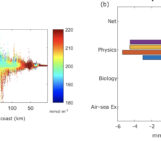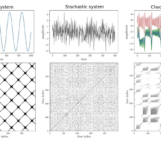The first days of October were marked by an extreme weather event: storm Alex, a cyclone of Atlantic origin, caused massive showers and thunderstorms over Provence, the Alps, Piedmont and Liguria. In these regions, numerous historical records of precipitation were broken causing the flooding of several streams and rivers in which many people lost their lives. Economic damage was also significant and entire villages, crops and ecosystems have been literally swept away by the fury of the water. In short, it was an exceptional storm due to the amount of rain that fell (in Saint-Martin-Vésubie, France, the amount of rain fell in one day was about the same that is usually recorded in about 6 months) but also due to the territorial extent of the damage that was not limited to a few municipalities as often happens during these events but rather extended to entire regions.
In the current climate context, with global and regional warming now established and soon beyond the 1.5C threshold of the 2015 Paris Agreement, many immediately connected the exceptional nature of the event to the effects of climate change. However this link, which undoubtedly exists, is not immediate and must be explained by analyzing the different components that contributed to this event.
The heavy rains were produced by the depression circulation associated with storm Alex. This cyclone, which formed off Brittany, was not only very intense compared to those generally observed at the beginning of autumn, but also followed an anomalous trajectory: while usually the depressions of Atlantic origin progress from west to east, bringing rainfall on different regions during their life cycle, Alex was stuck on France for many very long hours. In this position, thanks to the circulation of anti-clockwise winds around his eye, Alex caused strong Libeccio winds on Provence and Liguria and exploited the abundant humidity and heat reserves of the Mediterranean Sea to produce persistent rainfall on the areas on which the twenty. The exceptionality of these rains is therefore due not only to the availability of humidity and heat from the sea but also to the unusual trajectory of the cyclone.
To understand the link between this event and climate change, it is necessary to evaluate both the marine thermal component and the trajectory of the cyclone and ask whether both are favoured in a warmer world. The role of the warming of the Mediterranean Sea in increasing the amount of precipitation in this area has been demonstrated in recent studies with high resolution models: a warmer sea favours evaporation and acts as a strong heat pump and detonator for thunderstorms and rain showers. The atmosphere, which is also warmer, can host a higher quantity of precipitable water. As for the trajectory and the abnormal intensity of the storm Alex, the link with climate change is still to be clarified and will have to be determined by future studies. The main problem is the low frequency of this type of cyclones and the total absence of data before the satellite era (the late 70s) which prevents the determination of significant statistical trends in the current data. Another obstacle concerns the simulation of these events with climate models: their intensity and the detailed description of their trajectory requires enormous computational resources that were not available until a few years ago.
The elements in favour of an important contribution of climate change to this kind of phenomena are however worrying and require immediate attention to the problem both through the reduction of greenhouse gas emissions and through prevention strategies through landscape / engineering adaptation.




